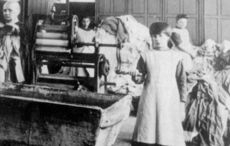• A decade of challenge and change in Irish and Irish-American music
Top Irish-American albums of the decade
• Black 47: 'Trouble in the Land'
• Prodigals: 'Needs Must When the Devil Drives'
• Pierce Turner’s '3 Minute World'
• Enter the Haggis: 'Casualties of Retail'
• Dropkick Murphys: 'Blackout'
Top Irish albums of the decade
• U2’s 'All that you can’t Leave Behind'
• Afro Celt Sound System’s 'Volume 3: Further in Time'
• Sinead O’Connor’s 'Throw Down your Arms'
• 'VH1 Presents The Corrs: Live from Dublin'
The blueprint of this decade of global assimilation began with a band of Irish and African musicians that began to jam in Peter Gabriel’s Real World Studios. Released on June 18, 2001, The Afro Celt Sound System’s "Volume 3: Further in Time" was 70 minutes and 42 seconds of wicked international grooves that sounds like nothing that came before or after it.
"Further in Time" brought the Afro Celt Sound System a Grammy nomination, primarily for the cinematic ambient epics of “North/North 2,” the ferocious Celtic/African jam of “Colossus,” and radio-friendly ditties like “When You’re Falling.” There is something for everyone on this album, which is chock-full of sharp fiddle and flute playing that is Irish and otherworldly at the same time.
The formal band lineup for "Volume 3" included Simon Emmerson, James McNally, Iarla O’Lionaird, Martin Russell, N’Faly Kouyate, Demba Barry, Johnny Kalsi, Moussa Sissokho, uilleann piper Emer Mayock, and newcomer Mass. The list of contributing guest musicians included some very big names, including Peter Gabriel (who sang vocals and played keyboards on the hit single “When You’re Falling”), former Led Zeppelin lead singer Robert Plant, who provided lead vocals for “Life Begin Again,” and Altan’s Mairead Ni Mhaonaigh and Ciaran Tourish. British producer Stephen Hague (New Order, Erasure, Pet Shop Boys) co-produced several tracks alongside Simon, Martin, and James, ensuring that no melody was twisted without alienating anyone on the dance floor.
Industry veteran James McNally became an all-Ireland champion on the accordion, piano and bodhrán by the age of 16, and found his way on records by U2, Sinead O'Connor, Depeche Mode, Ronan Keating, Marxman, Eddi Reader, Annie Lennox, Peter Gabriel, and Big Country. After a brief stint in the Pogues, he set out to reinvent Irish music with the Afro Celts.
“If we just played Irish music, we'd have our core, just as if we just performed African music we'd find a base of people who'd love it,” he told the New York Post in 2003.
“But we try to cross-pollinate and also use electronica to allow people to actually think about their heritage and their culture as something that's not of the past, but still very important and still evolving. Our success lies in the balance; we're not just sticking African vocals on beats and grooves — we actually move from scene to scene in our passages like a drama. We try to take people on a journey.”
He is joined by Iarla O’Lionaird. Iarla grew up in Cuil Aodha, a small Gaelic-speaking community in County Cork in the west of Ireland.
His “sean nos” style of singing and Gaelic phrasing made the African music sound more African, as the Irish were able to sing along in their native tongue. He says of his penchant for singing in the Gaelic language, “I always operate on the basis that no one ever understood what I was singing about for the most part because I sing in Gaelic. So, I always asked myself, 'Why are people coming to my concerts and buying my records?’ And it’s simply because they’re hearing something else. The words and poetry of the old Gaelic songs that I sing are something I also aspire to in my own work. That simplicity and brevity is something I try to bring to the Afro Celts as well.”
The Afro Celts have had famous guests like Eileen Ivers and Sinead O’Connor sit in with them on past projects, but the biggest rock stars on the planet lined up to play with them on "Further in Time." Robert Plant howled his way through one of O’Lionaird’s poems, approaching mysticism not seen since he played with Jimmy Page.
“This is the day and the hour / The time when the changing begins / The land and the sky fallen silent / Quiet moves o’er the plain / Quiet moves o’er the plain / The silence moves over the plain / The land and sky are quiet / The heart is beating within / Her song echoes a calling / For life to begin again,” he chanted on “Life Begin Again” — as flutes, fiddles, and exotic percussion matched his emotional intensity. Peter Gabriel, the unofficial godfather of the group, contributes a moving vocal to the band’s one hit, “When You’re Falling.”
“I can see through the clouds / I can walk right through the walls / Hang me off the ceiling / But I can't take the fall / Should have crossed the river / But I may get swept away / Out there on the water / You can still see me wave,” he sings.
Unfortunately for the group, the song and the video hit around the same time as the 9/11 disaster, and the images of people falling to their deaths from the Twin Towers made playing the song or the video in poor taste at the time. Because of this bad timing, we will never know what would have become of this band. They released a few more albums and remix projects before the band and Real World Records parted ways, but they never seemed to scale the heights of "Further in Time" during the rest of the decade.




Comments